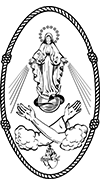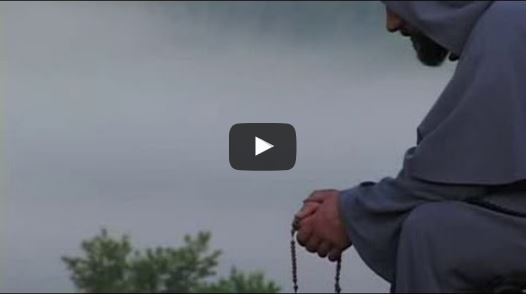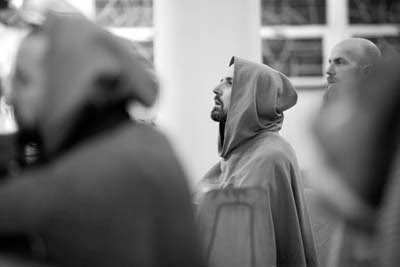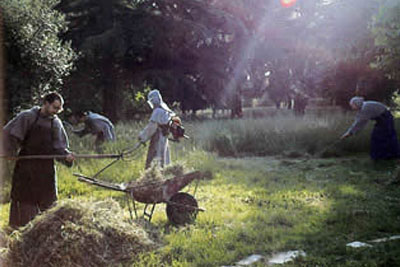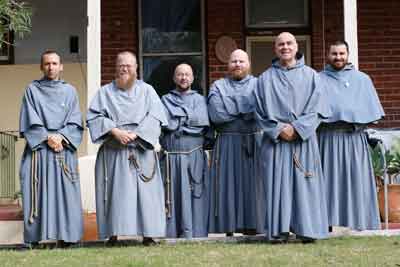Franciscan-Marian Charism
A Franciscan-Marian Way of LifeA Franciscan-Marian Way of Life
A community of prayer, of poverty, of penance, in the spirit of total consecration to the Immaculate Virgin in the manner of St. Maximilian Mary, so that She may transform us, like St. Francis, into Jesus Crucified, and may let us be consumed in the conquest of all souls for God.
Thus do we love to formulate the manner of Franciscan life of a Casa Mariana (or Marian Friary), in which observance prevails of the Rule and Constitutions according to the model of primitive Franciscan communities and after the recent example offered us by St. Maximilian Mary Kolbe.
It is the Holy Father, Pope Paul VI, who guided us along this course with his inspired and enlightened word. It is he who recommended that we be completely faithful to the Holy Rule of our father St. Francis according to the spirit and the letter: “Do not relax the spirit of the ancient Rule nor contradict the letter of it.” It is he who urged “the faithful, continued embodiment of the example and teaching of our Seraphic Father” as we see it in St. Maximilian’s life.
Like our father St. Francis, we must perceive that we are called to become like Jesus (“to be conformed to the image of His Son” – ROMANS 8:29), crucified with Him (“I have been crucified with Christ” – GALATIANS 2:19), configured, patterned, according to His death (“grown into union with Him through a death like His” – ROMANS 6:5), transformed into Him, identified with Him (“I live, no longer I, but Christ lives in me” – GALATIANS 2:20).
Like our father St. Francis, in total devotion to the divine mysteries if the Incarnation and Redemption, we must constantly seek to reproduce in ourselves Jesus’ conditions of immolation. At Bethlehem it was a condition of poverty; at Nazareth, a hidden life of toil; in the wilderness it was a condition of seclusion, penance and contemplation; during His public life He gave Himself over to works of zeal, at the same time suffering persecution; in His Passion and Death He suffered contempt, pain, and defeat; in the Eucharist He offers Himself as an example of silence and abasement.
Like our father St. Francis, we want to live a condition of brotherhood in the love of our divine Brother, Jesus, and of our Immaculate Mother, Mary, so as to succeed in becoming true friars (“brothers”) on the supernatural level of perfect theological charity.
Like our seraphic father St. Francis, we ought to achieve a love for Jesus which would be utmost, which would be passionate, and thus a love in Jesus for our brothers in our common life of prayer, poverty, and penance.
These should make up the distinctive features of our religious life according to the thought of Pope Paul VI, who recommended that we be faithful to the spirit of St. Francis, “which is a spirit of prayer, of austere living, of poverty, and especially of burning love for Jesus Christ and the brethren” (from the address of Pope Paul VI to the Order of Friars Minor Conventual, June 25, 1969).
“The more we belong to the Immaculate Virgin, the better we will understand and love the Heart of Jesus, God the Father, the Holy Trinity”
And in order that all this may be achieved in the “shortest, safest, easiest” way, as St. Maximilian says, we want to be “instruments,” “materials,” unobtrusive “nobodies” in the hands of the Immaculate Virgin, our Mother and Queen, consecrated to Her unconditionally, irrevocably, with no limit set, until we reach a perfect union with Jesus.
These are St. Maximilian’s words:
“Our life must be an extension on this earth of Jesus’ life by means of Mary” (from a conference on July 5, 1936). “The more we belong to the Immaculate Virgin, the better we will understand and love the Heart of Jesus, God the Father, the Holy Trinity” (from a letter written after November 10, 1934). “One who is consecrated knows that in the Immaculate Virgin and through the Immaculate Virgin one will, in the quickest and easiest possible way, become one with Jesus, on with God. He knows that in and through him She will love Jesus in a matchless, perfect manner, in whatever one may seek to do, whatever be the way… He knows that this is the only way to that sanctity which is the easiest and most sublime, tending to God’s greatest glory” (from “Material for A Book”).
